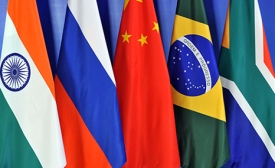soft power
Both writers state that irrespective of what the world media has to say, true soft power is only gained by actions - by what these countries individually do. No amount of branding exercise can help their image if not backed by actions.
Call it a pilot project, trial balloon, or infomercial, the residency falls under the larger heading of "soft power" that includes importing and exporting films, artists, and music between the two countries. Nowhere does the Philadelphia Orchestra residency embody that more than in Friday’s concert, at which the orchestra will premiere Interrupted Dream by Chinese composer Du Wei.
The arrival of Chen Guangcheng, a blind Chinese activist, in New York on May 19th marked a quiet resolution to a thorny problem for American diplomacy with China over human rights. It also suggested that, in spite of political tension at the highest levels of the Communist Party, Chinese leaders remain united enough to handle a crucial relationship pragmatically. But compromising with the superpower involves a balancing act at home.
Visiting top Chinese legislator Wu Bangguo and his Spanish counterpart called for more economic and cultural exchanges between the two countries on Thursday to boost bilateral ties. Wu, chairman of the National People's Congress, the country's top legislative body, said Spain, whose relations with China have sustained nearly four decades, is one of the China's best friends in the European Union.
The attractiveness of European culture constitutes a formidable component of the EU's soft power in China. The EU could increase its soft power by further building trust and reducing perceptions of European aggressiveness.
The emerging ‘Beijing consensus’ – comprising soft power diplomacy and market power, combined with the concept of China’s “peaceful rise” – has influenced Australia’s political and business decision makers that a ‘tilt’ towards Beijing is in the national interest.
...China has rediscovered its ancient culture and traditions. Confucius enjoys a remarkable renaissance. All around the world, China has established Confucius Institutes that spread knowledge about China’s culture and its language. Soft power is not an esoteric asset. It helps a country gain respect and friends in the world at large. And, this can be of great importance, particularly in turbulent times.

Sherine B. Walton, Editor-in-Chief
Naomi Leight, Managing Editor
Kia Hays, Associate Editor







